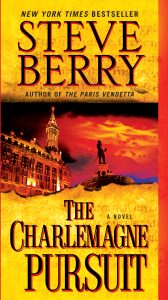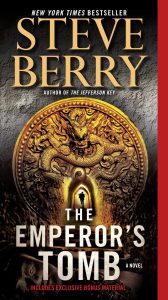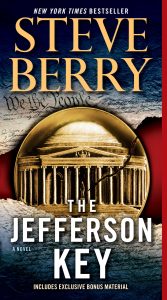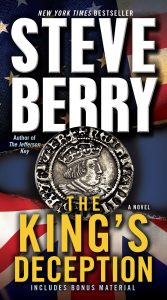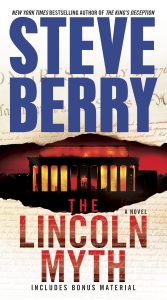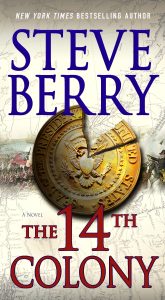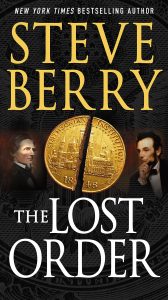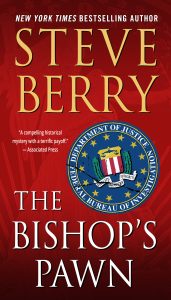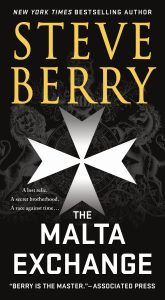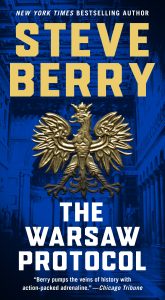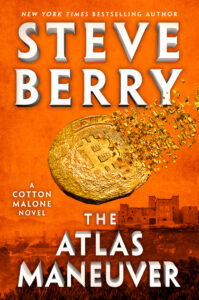The Venetian Betrayal
Cotton Malone Series Book 3
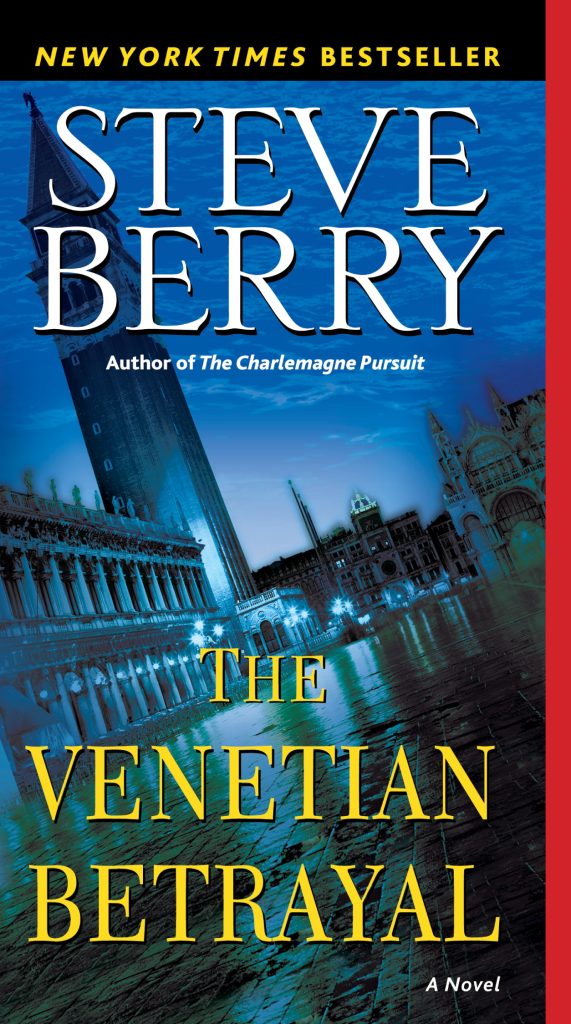 Buy the Book:
Buy the Book:Amazon
Apple Books
Barnes & Noble
IndieBound
Kobo
Signed Copy
Audible
Libro.fm
Amazon Canada
Synopsis
In 323 B.C.E, having conquered Persia, Alexander the Great set his sights on Arabia, then suddenly succumbed to a strange fever. Locating his final resting place-unknown to this day-remains a tantalizing goal for both archaeologists and treasure hunters. Now the quest for this coveted prize is about to heat up. And Cotton Malone-former U.S. Justice Department agent turned rare-book dealer-will be drawn into an intense geopolitical chess game.
After narrowly escaping incineration in a devastating fire that consumes a Danish museum, Cotton learns from his friend, the beguiling adventurer Cassiopeia Vitt, that the blaze was neither an accident nor an isolated incident. As part of campaign of arson intended to mask a far more diabolical design, buildings across Europe are being devoured by infernos of unnatural strength.
And from the ashes of the U.S.S.R., a new nation has arisen: Former Soviet republics have consolidated into the Central Asian Federation. At its helm is Supreme Minister Irina Zovastina, a cunning despot with a talent for politics, a taste for blood sport, and the single-minded desire to surpass Alexander the Great as history's ultimate conqueror.
Backed by a secret cabal of powerbrokers, the Federation has amassed a harrowing arsenal of biological weapons. Equipped with the hellish power to decimate other nations at will, only one thing keeps Zovastina from setting in motion her death march of domination: a miraculous healing serum, kept secret by an ancient puzzle and buried with the mummified remains of Alexander the Great-in a tomb lost to the ages for more than 1,500 years.
Together, Cotton and Cassiopeia must outrun and outthink the forces allied against them. Their perilous quest will take them to the shores of Denmark, deep into the venerated monuments of Venice, and finally high inside the desolate Pamir mountains of Central Asia to unravel a riddle whose solution could destroy or save millions of people-depending on who finds the lost tomb first.
"(Berry) proves once again that he has a genuine feel for the factual gaps that give history its tantalizing air of the unknown."
— The New York Times
"In this wonderfully crafted story, Berry once again proves why his five previous novels have sold nearly five million copies. Colorful characters and a solid plot take readers to the very edge."
— Tucson Citizen
"A pacy international thriller with a historical twist, from the New York Times bestselling author."
— Backstory.london
"A great story . . . Steve Berry is one of the few adventure authors who seems to be able to maintain his touch in novel after novel."
— Wisconsin State Journal
"Berry mixes in a historic view of Alexander the Great, based on his meticulous research, and fictionalizes it in a briskly paced story. As usual, the fate of the world hinges on the search. And don't think that Berry's sixth novel is just a testosterone-laden romp. Berry wisely mixes up the story with women and men who are equally apt, confident and intrepid . . . it's a formula that works."
— South Florida Sun-Sentinel
"The Venetian Betrayal is everything you'd expect it be, and that is pretty good."
— Richmond Times-Dispatch
"Lawyer turned writer Berry turns in his sixth stellar performance with this lightning-paced page-turner . . . Berry never disappoints, and his latest take on this mystery of history may be his best yet."
— Kingston Observer
"Fine reading for someone who wants the good guys to overcome impossible obstacles and finally win. And who doesn't like that?"
— Tampa Tribune
"Lots of exotic travel and plenty of derring-do. In short, this is the formula that Berry has perfected . . . it's a lot of fun, great airplane reading and a total escape from late-winter snowstorms."
— Globe and Mail
"The Venetian Betrayal has a little something for everyone . . . Berry fans will enjoy this fast-moving adventure."
— The Times-Picayune
"The Venetian Betrayal packs plenty of action and plot twists to keep you hooked."
— New Zealand Herald
"...the reader will be engaged from the first page, thrilled by the story, entertained by the characters, and spellbound by the author's sheer bravado. A must for high-adventure thriller fans."
— Booklist (starred)
"Massive plot twists and a relentless narrative pace result in another success from Berry. Expect this one to add to his readership and hit the best-sellers lists."
— Library Journal
"Four and a half stars out of five. A no holds-barred thriller. Cotton Malone is in top form."
— Romantic Times
"Add enough diplomats, spies, government agents, and double-agents to create confusion and uncertainty and the stage is set for a worldwide romp, but despite the intervention and interests of so many powerful entities, what it comes down to is Malone and his few friends against overwhelming odds in the best thriller tradition."
— Alfred Hitchcock Mystery Magazine
"Berry has once again found the perfect mix of fact and fiction, science and speculation, the mystical and the mundane. The plotting is airtight and the pacing roars along with the tachometer needle forever hovering in the red. Just make sure you're strapped in for the ride."
— Providence Journal
"...this international yarn, full of shoot-outs and explosions, won't disappoint fans of Berry's previous action-packed thrillers."
— Publishers Weekly
"Berry has adeptly managed to weave a variety of characters and an intriguing plot into a highly entertaining read. Readers who enjoyed Dan Brown's, The DaVinci Code will certainly enjoy this one."
— The Arkansas Traveler
"A great book that you can lose yourself in and get swept up by the plot."
— Coventry Telegraph
"Berry has gotten better and more ambitious with each of his books, . . . the last 100 pages are as fast-paced as you are likely to find in a novel this year."
— bookreporter.com
FROM THE BLOG WORLD
"You can lose yourself in The Venetian Betrayal and enter another world, where you can be bold and brave. It is a story which will absorb you as you race through page after page, and then tosses you breathless back into your chair when it all comes to an end. It's a use of knowledge and experience that pays off for the reader who loves books of high drama, suspenseful pursuits and intricate plots."
— www.jackiekcooper.com
"Let's just cut to the chase: Steve Berry, the phenomenally successful author of suspense-filled, action-packed, provocative thrillers has offered up another highly recommended adventure in The Venetian Betrayal . Buy it. Read it. Enjoy it."
— BookLoons.com
"Have you read the Cotton Malone thriller series yet? If not, I urge you to start today. If so, join the club. It is a first rate, page turning, suspenseful, unforgettable and thought provoking thriller which I just cannot put down."
— chooseandbook.blogspot.com
Excerpt
CHAPTER ONE
COPENHAGEN, DENMARK
SATURDAY, APRIL 18, THE PRESENT
11:55 P.M.
The smell roused Cotton Malone to consciousness. Sharp, acrid, with a hint of sulfur. And something else. Sweet and sickening.
Like death.
He opened his eyes.
He lay prone on the floor, arms extended, palms to the hardwood, which he immediately noticed was sticky.
What happened?
He’d attended the April gathering of the Danish Antiquarian Booksellers Society a few blocks west of his bookshop, near the gaiety of Tivoli. He liked the monthly meetings and this one had been no exception. A few drinks, some friends, and lots of book chatter. Tomorrow morning he’d agreed to meet Cassiopeia Vitt. Her call yesterday to arrange the meeting had surprised him. He’d not heard from her since Christmas, when she’d spent a few days in Copenhagen. He’d been cruising back home on his bicycle, enjoying the comfortable spring night, when he’d decided to check out the unusual meeting location she’d chosen, the Museum of Greco-Roman Culture–a preparatory habit from his former profession. Cassiopeia rarely did anything on impulse, so a little advance preparation wasn’t a bad idea.
He’d found the address, which faced the Frederiksholms canal, and noticed a half-open door to the pitch-dark building–a door that should normally be closed and alarmed. He’d parked his bike. The least he could do was close the door and phone the police when he returned home.
But the last thing he remembered was grasping the doorknob.
He was now inside the museum.
In the ambient light that filtered in through two plate-glass windows, he saw a space decorated in typical Danish style–a sleek mixture of steel, wood, glass, and aluminum. The right side of his head throbbed and he caressed a tender knot.
He shook the fog from his brain and stood.
He’d visited this museum once and had been unimpressed with its collection of Greek and Roman artifacts. Just one of a hundred or more private collections throughout Copenhagen, their subject matter as varied as the city’s population.
He steadied himself against a glass display case. His fingertips again came away sticky and smelly, with the same nauseating odor.
He noticed that his shirt and trousers were damp, as was his hair, face, and arms. Whatever covered the museum’s interior coated him, too.
He stumbled toward the front entrance and tried the door. Locked. Double dead bolt. A key would be needed to open it from the inside.
He stared back into the interior. The ceiling soared thirty feet. A wood-and-chrome staircase led up to a second floor that dissolved into more darkness, the ground floor extending out beneath.
He found a light switch. Nothing. He lumbered over to a desk phone. No dial tone.
A noise disturbed the silence. Clicks and whines, like gears working. Coming from the second floor.
His training as a Justice Department agent cautioned him to keep quiet, but also urged him to investigate.
So he silently climbed the stairs.
The chrome banister was damp, as were each of the laminated risers. Fifteen steps up, more glass-and-chrome display cases dotted the hardwood floor. Marble reliefs and partial bronzes on pedestals loomed like ghosts. Movement caught his eye twenty feet away. An object rolling across the floor. Maybe two feet wide with rounded sides, pale in color, tight to the ground, like one of those robotic lawn mowers he’d once seen advertised. When a display case or statue was encountered, the thing stopped, retreated, then darted in a different direction. A nozzle extended from its top and every few seconds a burst of aerosol spewed out.
He stepped close.
All movement stopped. As if it sensed his presence. The nozzle swung to face him. A cloud of mist soaked his pants.
What was this?
The machine seemed to lose interest and scooted deeper into the darkness, more odorous mist expelling along the way. He stared down over the railing to the ground floor and spotted another of the contraptions parked beside a display case.
Nothing about this seemed good.
He needed to leave. The stench was beginning to turn his stomach.
The machine ceased its roaming and he heard a new sound.
Two years ago, before his divorce, his retirement from the government, and his abrupt move to Copenhagen, when he’d lived in Atlanta, he’d spent a few hundred dollars on a stainless-steel grill. The unit came with a red button that, when pumped, sparked a gas flame. He recalled the sound the igniter made with each pump of the button.
The same clicking he heard right now.
Sparks flashed.
The floor burst to life, first sun yellow, then burnt orange, finally settling on pale blue as flames radiated outward, consuming the hardwood. Flames simultaneously roared up the walls. The temperature rose swiftly and he raised an arm to shield his face. The ceiling joined the conflagration, and in less than fifteen seconds the second floor was totally ablaze.
Overhead sprinklers sprang to life.
He partially retreated down the staircase and waited for the fire to be doused.
But he noticed something.
The water simply aggravated the flames.
The machine that started the disaster suddenly disintegrated in a muted flash, flames rolling out in all directions, like waves searching for shore.
A fireball drifted to the ceiling and seemed to be welcomed by the spraying water. Steam thickened the air, not with smoke but with a chemical that made his head spin.
He leaped down the stairs two at a time. Another swoosh racked the second floor. Followed by two more. Glass shattered. Something crashed.
He darted to the front of the building.
The other gizmo that had sat dormant sprang to life and started skirting the ground-floor display cases.
More aerosol spewed into the scorching air.
He needed to get out. But the locked front door opened to the inside. Metal frame, thick wood. No way to kick it open. He watched as fire eased down the staircase, consuming each riser, like the devil descending to greet him. Even the chrome was being devoured with a vengeance.
His breaths became labored, thanks to the chemical fog and the rapidly vanishing oxygen. Surely someone would call the fire department, but they’d be no help to him. If a spark touched his soaked clothes . . .
The blaze found the bottom of the staircase.
Ten feet away.
Also in this series:


